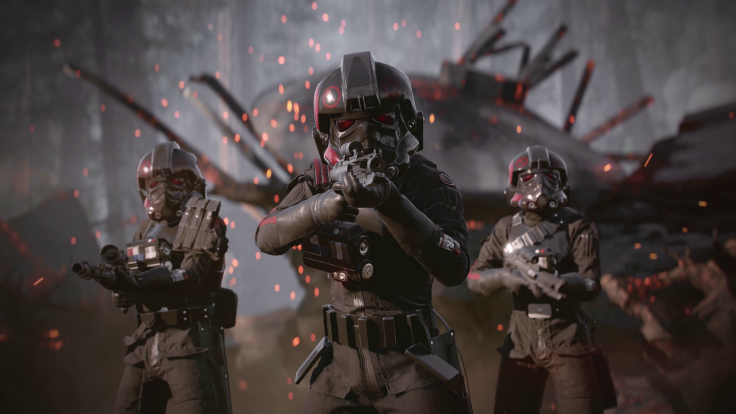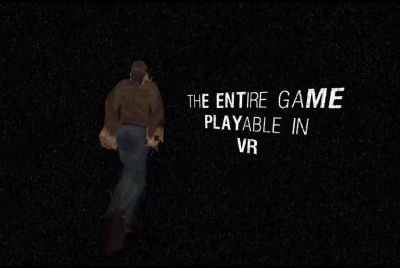Star Wars Battlefront 2 writer Mitch Dyer on creative freedom and what the series means to him
EA and DICE's new game includes a narrative-driven campaign set between the original and new trilogies.
This weekend marks the anticipated release of Star Wars Battlefront 2, the latest blockbuster game based on LucasFilm's monolithic franchise.
The sequel is a direct response to the first game, and the problems many fans of the galaxy far far away had with it. This means more maps, more weapons, a greater depth to the gameplay and, most notably, a single-player, story-based campaign mode.
Players will experience the story of Iden Versio, an elite Imperial soldier, during and following the fall of the Empire at the end of Return of the Jedi.
IBTimes UK sat down with the campaign's writer Mitch Dyer to discuss working on a beloved series and the level of creative freedom offered to him while working within the multi-billion dollar franchise.
Note: This interview was conducted in early October, before the issue of loot boxes and microtransactions in the game arose.
IBTimes UK: What does working on Star Wars mean to you?
Mitch Dyer: This is my first project, so for me, it's especially odd that I get to come into this new studio [EA Motive], work on Star Wars and Battlefront, which is one of my favourite things ever in Star Wars. I would skip classes to play Battlefront back when I was in high school. So now I get to help contribute to a game that will inevitably lead to people skipping classes.
On a more personal level, my dad introduced me to Star Wars when I was like 10-years-old. That was the moment where I realised I want to be a storyteller. I want to write stories, 'cause this is great. I love adventure. Since then it's just been my childhood dream to write Star Wars and now I get to create a campaign that my dad is going to play, 'cause he's a huge Battlefront player.
He played Battlefront 2015 for 250 hours or something. Like, way more than I did. So now it's an odd feeling that we not only get to work on Star Wars, but I get to work on a Star Wars story that is going to mean something to my dad, which is cool.
Let's talk about the level of creative freedom you have, especially considering your campaign takes place in the very large gap between Return of the Jedi and The Force Awakens.
We [Motive] had no idea what it was going to be like to work on Star Wars with LucasFilm. So we thought we would go in and say, "Okay, so what can we do?" But instead the response from the Lucasfilm story group was, "No, no, no. What do you want to do?"
So we rolled out ideas and said, we want to do this Imperial story, special forces, details, details, details, and they were excited by it because it was new and it instantly felt authentic, because it's in a period of time that is unexplored, like you said. And that's rich for storytelling opportunity.

We started making the game around the time The Force Awakens was in theatres, which means all the novels leading into the movie are coming out and it's starting to sort of dabble a little bit in that timeline, but a lot of it's undefined, which is perfect. 'Cause for us, we can add new things, like Iden and Inferno Squad and Vardos her home world and other new planets and cool locations and just keep coming up with a bunch of new stuff.
As long as it's authentic and feels genuine and ties into Star Wars in a way that benefits the universe and feels like it belongs in the galaxy, then you get a lot of traction and people get excited within the studio and at LucasFilm and that's how you end up with something like a novel tie-in [Inferno Squad by Christie Golden].
The Expanded Universe covered a lot of the territory after Return. None of it is canon anymore, but were you influenced or inspired by any of that work?
Not necessarily directly. It wasn't like we looked and one novel and said, "Let's do this." Because we wanted to add our own flavour, right? Like if you get an opportunity to write a Star Wars story, you don't want to just recreate what's been done. You want to make your mark and add new things and then hopefully that gets touched on and inspires other people.
But in general that's stuff that we had read and we were voracious consumers of all Star Wars media, especially the new timeline stuff, 'cause that's going to be important for continuity. I grew up reading Out of the Empire, Last Command, Dark Force Rising, the [Timothy] Zahn stuff, the X-Men books. That stuff was super important to me, but it's as important to me as the Genndy Tartakovsky animated series or Dave Filoni's Clone Wars and Rebels series, or Claudia Gray's novels.
The way I've been thinking about Star Wars lately is that it's a single story, right? The galaxy is one gigantic place where a bunch of things happen that contribute to the Star Wars universe. Every time you see a novel, a short story, a game, whatever it is, those are just chapters in the grander Star Wars saga and we get to be one of those, which is pretty surreal.




















